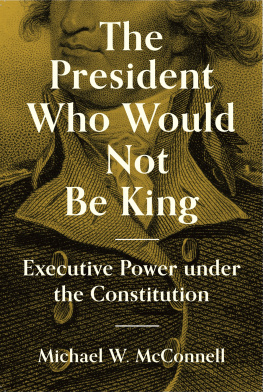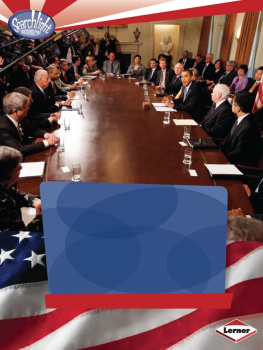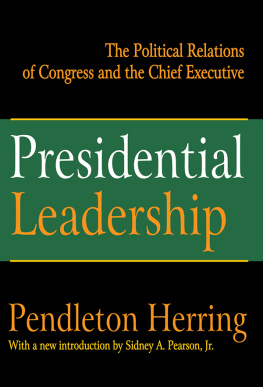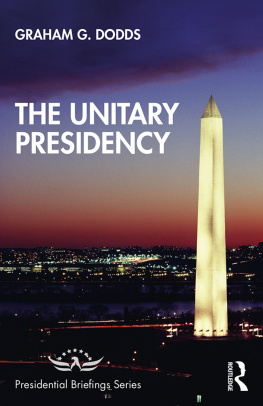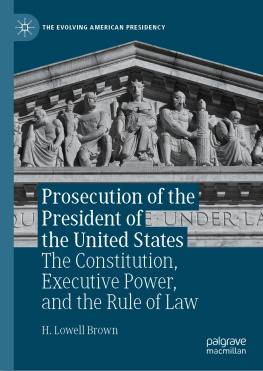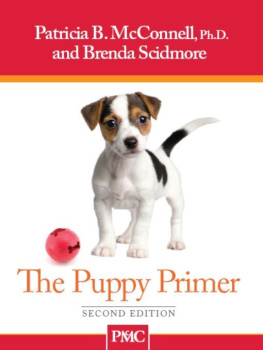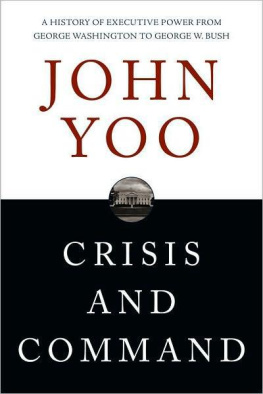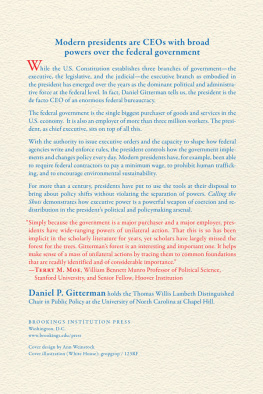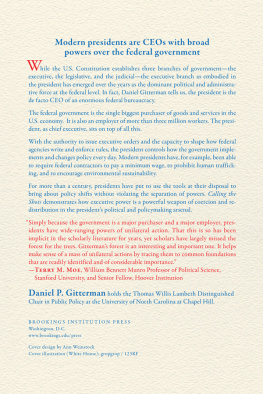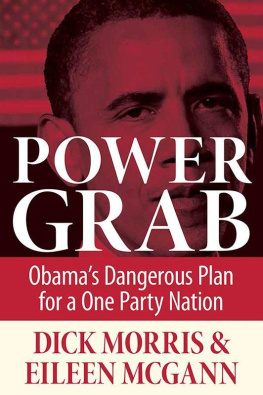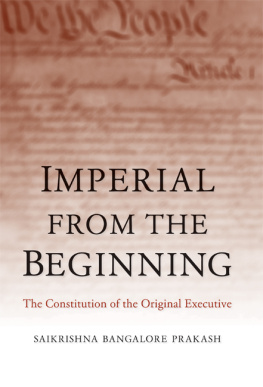THE PRESIDENT WHO WOULD NOT BE KING
THE UNIVERSITY CENTER FOR HUMAN VALUES SERIES
Stephen Macedo, Editor
A list of titles in this series appears at the back of the book.
The President Who Would Not Be King
EXECUTIVE POWER UNDER THE CONSTITUTION
MICHAEL W. McCONNELL
PRINCETON UNIVERSITY PRESS
PRINCETON & OXFORD
Copyright 2020 by Princeton University Press
Requests for permission to reproduce material from this work should be sent to
Published by Princeton University Press
41 William Street, Princeton, New Jersey 08540
6 Oxford Street, Woodstock, Oxfordshire OX20 1TR
press.princeton.edu
All Rights Reserved
ISBN 978-0-691-20752-0
ISBN (e-book) 978-0-691-21199-2
Version 1.0
British Library Cataloging-in-Publication Data is available
Editorial: Bridget Flannery-McCoy and Alena Chekanov
Production Editorial: Leslie Grundfest and Mark Bellis
Jacket Design: Jessica Massabrook
Production: Erin Suydam
Publicity: Kate Hensley and Kathryn Stevens
Copyeditor: Michelle Garceau
Jacket Credit: George Washington (17321799) / Classic Image / Alamy Stock Photo
[U]nhappily the ideas which some members have adopted, respecting the authority of our Executive, are derived from a recollection of what was the Executive authority in the Government which we once lived, and of what they have read in books written to support that Government. But there cannot be a greater error than to adopt these ideas; for the Executive authority of the United States, flowing from the people, the PRESIDENT, or person invested with that authority, elected by them, at short stated periods, allowed only a limited negative on the laws of Congress for which negative too he is to give reasons, which, if not satisfactory to two-thirds of both Houses, are to be disregarded, and the law is to be valid without his assent; restrained from creating offices, giving salaries, or making war, and bound to give account of the state of the Union to Congress, and moreover impeachable by the House of Representatives, and triable by the Senate, cannot be compared to one of those monarchs who hold their Kingdoms and subjects by hereditary right; to whom all property and power originally are supposed to belong; from whom all honor and authority flow; who can declare war and make peace, and to sanction whose acts of sovereignty it has been thought prudent to affirm that they can do no wrong: I say, sir, that there can be no resemblance between such an awe-commanding being, and our fellow-citizen, the PRESIDENT OF THE UNITED STATES.
REPRESENTATIVE JOHN PAGE IN THE HOUSE OF REPRESENTATIVES, MARCH 15, 1796
FOREWORD
THE SUBJECT of this book could hardly be more important: the nature and limits of executive power under the US Constitution. It goes to press at a time marked by intense concern about the erosion of checks on the powers of the American Presidency. The sense of constitutional degradation is widespread, though by no means universal.
Michael W. McConnell sets out a new framework for assessing the constitutional legitimacy of exercises of executive power, and indeed, a new way for thinking about the relations of the three branches of the federal government. We are delighted to publish it in the University Center for Human Values Series, and owe this to the fact that Professor McConnell delivered the Tanner Lectures on Human Values at Princeton University on November 28 and 29, 2018.
At the time of his lecture, and somewhat unusually for a Tanner lecturer, Professor McConnell already had a near-complete draft of the book as a whole. He used those two lectures to lay out its main themes.
We were delighted at that time to welcome four distinguished commentators all of whom engaged Professor McConnell in vigorous debate and discussion over the course of the two days. The commentators were: Gillian Metzger, the Harlan Fiske Stone Professor of Constitutional Law at Columbia University; Eric Nelson, the Robert M. Beren Professor of Government at Harvard University; Jeffrey K. Tulis, Professor of Government at the University of Texas at Austin; and Amanda L. Tyler, the Shannon Cecil Turner Professor of Law at the University of California at Berkeley. Our thanks to these scholars for their extremely valuable comments and suggestions.
It is a great pleasure to publish this important book in the University Center Series. I have known and admired Michael McConnells work for decades, and am far from alone in that. His writings on the Constitutions religion clauses is among the most important and widely cited work by any constitutional scholar.
As a constitutional advocate, Professor McConnell has argued fifteen cases in the US Supreme Court. These include famous ones such as Rosenberger v. the University of Virginia (1995), and Christian Legal Society Chapter of Hastings College of Law vs. Martinez (2010), both of which concerned viewpoint discrimination by public universities against Christian student groups.
Professor McConnell served in several positions in the Administration of President Ronald Reagan, and was nominated to the federal court by President George W. Bush. He is generally regarded as a political conservative but the Senate confirmed unanimously his nomination to the federal court, and he is widely respected by liberal scholars and jurists. Indeed, as a law professor he secured a fellowship at the University of Chicago Law School for a young Harvard Law School graduate and former community organizer, after being impressed by that students suggestions on one of McConnell Harvard Law Review articles: that student was Barack Obama. And he taught our Princeton University President, Christopher L. Eisgruber.
I am delighted to add this important volume to the University Center series.
Stephen Macedo, Series Editor
Laurance S. Rockefeller Professor of Politics and the
University Center for Human Values
ACKNOWLEDGMENTS
A PROJECT like this cannot be done without a great deal of help and encouragementstarting with the students in my course, Creation of the Constitution, who have discussed and argued these ideas over the past decade, and whose earnest enthusiasm is an inspiration every day. Likewise, my colleagues at Stanford Law School and the Hoover Institution, who have read drafts, discussed ideas, and generally provided support during the research and writing of this book.
Equally important are scholars around the country who read part or all of the book in its earlier stages and offered comments and criticism. These include Jack Balkin, William Baude, Sam Bray, Mary Sarah Bilder, Steven Calabresi, Jud Campbell, Nathan Chapman, Linsday Chervinsky, Martin Flaherty, Jonathan Gienapp, Jack Goldsmith, Philip Hamburger, John Harrison, Roderick Hills, Andrew Hyman, Gary Lawson, Lawrence Lessig, Maeva Marcus, Jenny Martinez, William Marshall, John McGinnis, Bernadette Meyler, Gillian Metzger, Julian Davis Mortenson, Eric Nelson, Michael Stokes Paulsen, Saikrishna Prakash, Zachary Price, Jack Rakove, Michael Ramsey, Robert J. Reinstein, Abe Sofaer, Ilya Somin, Geoffrey Stone, Seth Barrett Tillman, Amanda Tyler, John Vlahoplus, Beth Williams, and Ilan Wurman, as well as the participants at faculty workshops at Fordham, NYU, Northwestern, Penn, and Stanford Law Schools, and the Originalism Works in Progress Conference at the University of San Diego. Special thanks to Stephen Macedo and Christopher Eisbruger for inviting me to present this work as the Tanner Lecture in Human Values at Princeton University in 2018.

